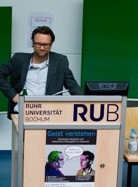|
THE SCIENCE OF CONSCIOUSNESS CONFERENCE Monday, April 25, 9 am to 1 pm Pre-Conference Workshop
KANT AND THE CONSCIOUS MIND The writings of 18th century German philosopher Immanuel Kant are a groundstone of Western philosophy, and relate to modern cognitive science and the nature of reality. Tobias Schlicht, Professor of Philosophy at Ruhr University in Bochum, Germany, will discuss Kant in the context of conscious versus unconscious mental states, global workspace, functionalism, dual-aspect theory and resting state brain in default mode networks.
Prof. Dr. Tobias Schlicht Institut für Philosophie II Ruhr-Universität Bochum
Description: Theoretical positions from historical figures in philosophy are not only interesting in their own right but can sometimes be especially helpful in teaching us systematic ways of inquiry that are ignored or simply unknown in contemporary debates. In several recent publications, it has been suggested that various claims from Kant’s tentative Philosophy of Mind not only have counterparts in the contemporary cognitive science of the mind but can guide cognitive science in its quest to discover the function and nature of consciousness (e.g. Hanna & Thompson 2003; Northoff 2010, 2012; Fazelpour & Thompson 2015; Schlicht, Newen 2015). Some of them have focused especially on intrinsic brain activity and its relation to Kant’s notion of the spontaneity of consciousness. More generally, Brook (1997) has claimed long ago that many of Kant’s claims make him the “intellectual godfather of cognitive science” (e.g. his distinction of percepts and concepts, his method of transcendental argument). This workshop has two purposes: First, to (a) outline central claims of Kant’s philosophy of Mind. This is no easy task since Kant has not fully developed a full-fledged theory of consciousness or mental phenomena; rather, everything he has to say about the structure and function of mental phenomena is in the service of his epistemological project of developing a theory of knowledge. Nevertheless, central passages from the Critique of Pure Reason, his Anthropology, and Critique of Judgment will lead to a coherent framework of how to think about consciousness and its relation to cognition and the brain. This brings us to the second purpose, namely, to (b) situate Kant’s claims in contemporary debates on consciousness, (c) to evaluate which of his claims are still of use for a thoroughly naturalist approach to the mind and, more specifically (d) to evaluate whether recent claims that recent developments in cognitive neuroscience suggest a “Kantian brain” are justified (Schlicht, Newen 2015).
Outline (4 hrs):
Optional - Pre-Conference Workshops Workshops are held: Monday/Tuesday, April 25 - 26 Monday Morning 9-1: Monday Afternoon 2-6 Monday Evening 7-10 and Tuesday Morning 9-1 half day and evening Workshops Early Workshop Fees: TSC Student Registrants $40 half day TSC General Registrants $60 half day General Public - Student - Workshop only $75 half day General Public - Workshop only $125 half day
|
|
|||||||||||||
